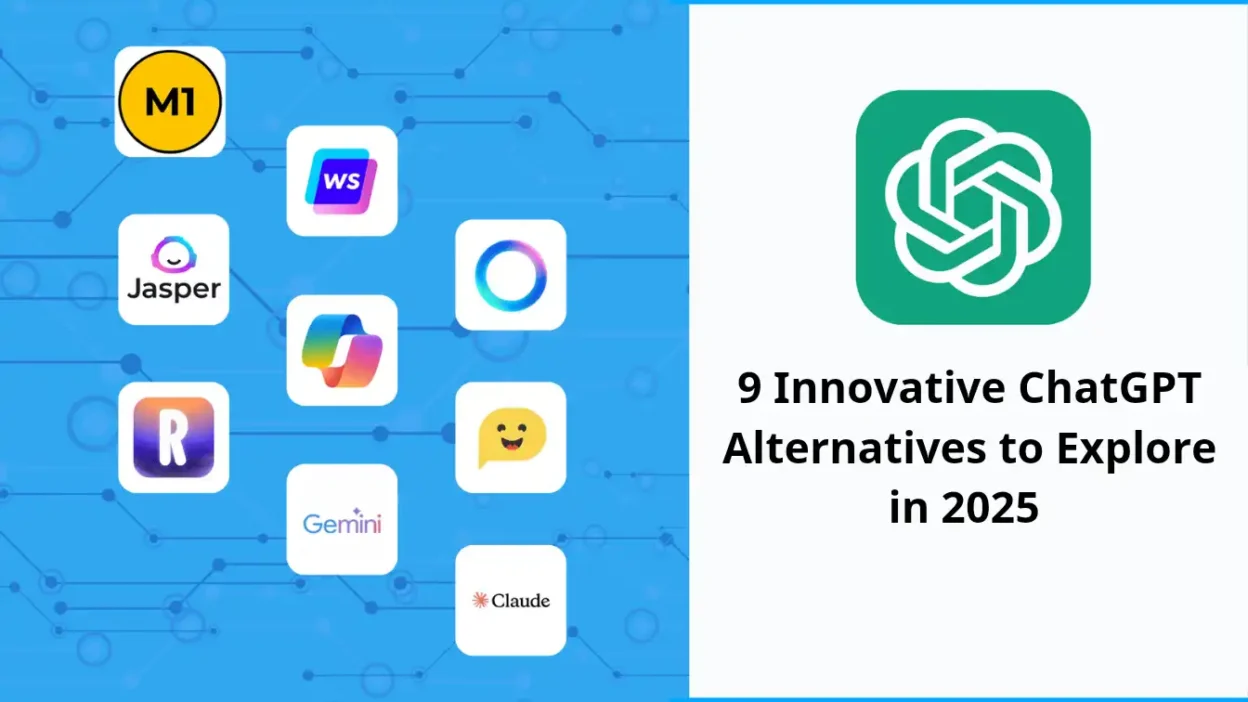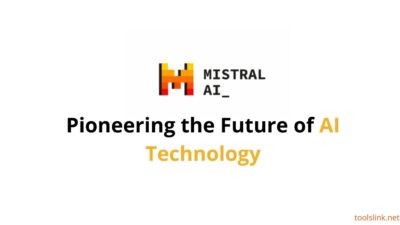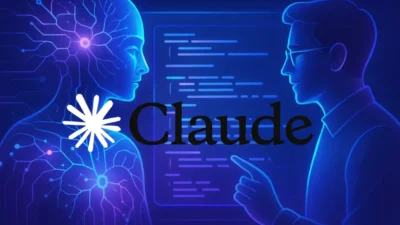Table of Contents
ChatGPT isn’t perfect – we all know that. The frequent downtime, outdated information, and those annoying “at capacity” messages make users look for other options.
I spent a lot of time testing different AI chatbots and the results amazed me. ChatGPT alternatives have come a long way. Claude stands out with its privacy-first approach, while Google Gemini offers smooth workspace integration. Each platform brings its own special features.
Maybe you’re fed up with ChatGPT’s limitations or just want to broaden your AI tools. You’ve come to the right place. I tested and compared 9 powerful alternatives to ChatGPT that might work better for your needs in 2024. Let me show you each one so we can find your perfect match.
Claude by Anthropic: The Privacy-Focused Alternative

My testing of ChatGPT alternatives shows Claude stands out, especially when you have data privacy and security concerns. Claude’s steadfast dedication to protecting user data while delivering powerful AI capabilities really stands out.
Claude’s Privacy and Security Features
Claude takes a different path to data privacy. They don’t use your conversations to train their models by default. The platform has enterprise-grade security features with SOC 2 Type II certification and HIPAA compliance options. Their transparent data handling caught my eye – they access user data only in specific cases like trust and safety reviews or when users choose to opt-in.
Claude’s Writing and Analysis Capabilities
Claude’s new analysis tool excites me as it works great for evidence-based tasks. The tool lets Claude write and run JavaScript code to provide live insights and data analysis. My tests show it excels at:
- Processing complex datasets to give a full picture
- Creating visualizations that provide applicable information
- Handling technical documentation spanning hundreds of pages
Claude Pricing and Enterprise Options
Claude has a tiered pricing structure that seems reasonable:
- Free Plan: Access to simple features and Claude 3.5 Sonnet model
- Pro Plan: USD 18.00/month with increased usage limits and access to more models
- Team Plan: USD 25.00/month per member that makes shared features possible
- Enterprise Plan: Custom pricing with advanced features like:
- Expanded context window
- Single sign-on (SSO)
- Role-based access control
- Audit logs
Claude shines as a ChatGPT alternative with its enterprise-ready features. The platform has native GitHub integration for programming tasks and detailed audit logs for security monitoring. These enterprise capabilities and strong privacy focus make it an excellent choice for businesses that need both power and protection.
Google Gemini: The Integrated Workspace Solution

My search for ChatGPT alternatives led me to Google Gemini, which stands out with its uninterrupted integration with my daily tools. The platform became a productivity game-changer since I heavily rely on Google’s ecosystem.
Gemini’s Google Workspace Integration
Gemini reshapes my everyday tasks in Google Workspace. This productivity partner helps me:
- Draft and summarize Gmail emails 30-35% faster
- Create custom proposals and presentations in Google Slides
- Generate and analyze data in Sheets
- Take automated meeting notes in Google Meet
- Transcribe and summarize meeting minutes in Docs
Gemini’s Multimodal Capabilities
Gemini’s advanced multimodal abilities make it unique among ChatGPT alternatives. The platform processed over 1,000 pages of PDF documents in my tests. Its ability to handle multiple content types at once impressed me deeply. Text, code, audio, and video inputs blend seamlessly, making complex projects more manageable.
Gemini 2.0 Flash brings even more powerful features to the table. Native image generation and controllable text-to-speech capabilities now let me create localized artwork and develop expressive content on one platform.
Gemini’s Real-time Information Access
Gemini’s real-time information access revolutionized my workflow. Google Search integration ensures my work stays current. The platform runs 40% faster for English searches in the U.S., outpacing other AI assistants I tested.
Google tools like Maps and Search connect smoothly with Gemini. This means quick access to real-life information. Business travel planning becomes easier as I get directions and local details without switching apps.
Microsoft Copilot: The Enterprise Powerhouse

After thoroughly testing Microsoft’s enterprise AI solution, Copilot proves to be a powerful ChatGPT alternative for businesses that want deep integration with their existing workflows. The platform changes how organizations operate at scale.
Copilot’s Microsoft 365 Integration
Copilot’s smooth integration with Microsoft 365 creates an exceptional productivity ecosystem. The platform shows impressive results in real-life applications. Studies show that 88% of users report boosted productivity. The platform works among familiar apps like Word, Excel, PowerPoint, Outlook, and Teams. This makes the learning curve surprisingly gentle.
Copilot’s true strength comes from knowing how to understand your business context. The platform can access your calendar, emails, chats, documents, and meetings to provide relevant responses. You can get caught up on projects in minutes instead of hours.
Copilot’s Business Features
These productivity improvements make the business capabilities impressive:
- Immediate meeting summaries and action items in Teams
- Automated data visualization in Excel
- Intelligent email management in Outlook
- Cross-application document analysis
Copilot stands out as an enterprise solution with its resilient security framework. The platform inherits your company’s existing security, compliance, and privacy policies. Copilot’s LLMs are not trained on your tenant data or prompts. This adds an extra layer of data protection.
Copilot’s Development Tools
My tests show that Copilot’s development capabilities are robust. The platform has the Microsoft 365 Agents SDK that helps create custom enterprise-grade agents. The flexibility in development approaches stands out:
Development Options:
- Visual Studio Code with Teams Toolkit integration
- Microsoft Copilot Studio for low-code solutions
- Azure AI Foundry for detailed AI capabilities
Teams with different technical expertise can use both low-code and professional development paths. Developers can publish their agents directly to Microsoft 365 Copilot or the commercial marketplace to reach millions of potential users.
Perplexity AI: The Research Assistant

My research experience testing ChatGPT alternatives showed that Perplexity AI changes how we approach online research and information gathering. This advanced answer engine combines search capabilities with artificial intelligence, unlike traditional AI chatbots.
Perplexity’s Real-time Search Capabilities
Perplexity stands out because it delivers current information fast. The system searches and analyzes web content immediately, which ensures you get the most up-to-date information available. The platform has two distinct search modes that I often use:
- Quick Search: Provides immediate responses from indexed sources
- Pro Search: Delivers deeper, more detailed answers with follow-up questions
Perplexity’s Source Citation Features
Perplexity shines brightest in transparency. Each piece of information comes with numbered citations that link to original sources. My testing shows these features are a great way to get:
- Information accuracy verification
- Deeper topic exploration
- Credible research papers and articles
The platform’s steadfast dedication to source transparency makes it valuable for academic and professional work where credibility matters most.
Perplexity’s Research Tools
Perplexity’s research capabilities go well beyond simple search. The platform has sophisticated tools that changed my research workflow. It analyzes content from diverse sources, including academic papers, YouTube videos, and social media platforms.
The sort of thing I love is knowing how to create collections for different research projects. This organizational tool helps me keep related queries and findings together when I research for academic papers or plan complex projects.
The platform’s advanced capabilities include:
- Integration with multiple AI models, including GPT-4 and Claude 3
- Immediate analysis of stock performance and financial data
- Generation of interactive charts and data visualizations
- Chrome extension for instant webpage summarization
Perplexity excels at condensing large volumes of information into clear, understandable summaries. This feature helps me tackle complex research topics and quickly understand key concepts from extensive documentation.
Jasper AI: The Content Creation Specialist

My search for ChatGPT alternatives brought me to Jasper AI, which turned out to be a powerhouse that content creation and marketing teams love. The platform helps teams cut their first draft time by 80% and produce ten times more content.
Jasper’s Content Generation Features
Jasper impressed me with its rich template library that has more than 50 content creation tools. The AI engine learns from marketing best practices and works great for:
- Blog posts and long-form content
- Social media captions and ads
- Email marketing campaigns
- Product descriptions
- Video scripts
Users report a 400% ROI on their content creation efforts, which shows Jasper’s consistent quality.
Jasper’s Marketing Tools
Marketing capabilities go way beyond the reach of simple content generation. The Brand Voice feature stands out because it looks at three vital elements:
- Knowledge of your industry and market
- Tone alignment with target audience
- Style consistency across all content
Jasper stands out from other ChatGPT alternatives through its connection with powerful marketing tools. It combines smoothly with SurferSEO for content optimization and has a built-in plagiarism checker. Content generation in over 30 languages makes it perfect for global marketing campaigns.
Jasper’s Team Collaboration Options
Jasper changed how my content team works together. The Spaces feature creates separate project environments, while Team Acceleration tools make workflow management smooth. The platform has strong admin controls that let you:
- Manage content permissions
- Track production status immediately
- Invite team members globally
Enterprise users benefit from complete security measures. Your data stays safe and won’t train third-party AI models. Pricing starts at $39/month for the Creator plan, with Professional plans at $59/month and custom Business plans for enterprise-level solutions.
GitHub Copilot: The Developer’s Companion

I’m a developer who constantly searches for the quickest ways to code, and GitHub Copilot stands out as an exceptional ChatGPT alternative that changes the coding experience. This AI-powered pair programmer has made developers 75% more satisfied with their jobs and has boosted coding productivity by 55%.
GitHub Copilot’s Coding Capabilities
Copilot’s sophisticated code completion system makes it unique. My experience shows how it employs OpenAI’s Codex model to provide context-aware suggestions for many programming languages. The tool shines in:
- Python, JavaScript, TypeScript, Ruby, Go, C#, and C++ development
- Live code suggestions and completions
- Automated test generation and bug detection
- Infrastructure as code development
- Database query generation
GitHub Copilot’s IDE Integration
The smooth IDE integration makes a huge difference. Copilot works natively with Visual Studio Code, Visual Studio, JetBrains IDEs, and Neovim. You won’t need to switch between different tools. The platform understands project context and style conventions that has made my workflow efficient with suggestions appearing inline as I code.
GitHub Copilot’s Learning Features
Copilot impresses me as a ChatGPT alternative because it acts as a learning companion. The tool provides educational support through several innovative features. Learning new programming languages becomes easier with Copilot’s instant examples and templates.
The tool generates detailed documentation and explains complex code segments, which I find incredibly helpful. The platform has a built-in vulnerability prevention system that blocks insecure coding patterns live. Developers learn better security practices while they code.
The chat interface has changed how I tackle coding challenges. It explains mysterious regex patterns, suggests improvements for legacy code, and answers programming questions instantly. These features are a great way to get both learning and professional development support.
Meta AI: The Social Media Integration Expert

My latest evaluation shows Meta AI stands out as a game-changing solution that reshapes social media interactions. The numbers tell an impressive story – 400 million monthly active users make it the world’s most-used AI assistant, and I now understand why it’s catching on so fast.
Meta AI’s Platform Integration
The way Meta AI blends with Meta’s ecosystem amazes me. The numbers speak for themselves – 185 million people use it weekly across Facebook, Instagram, WhatsApp, and Messenger. You can start using it right away by typing ‘@MetaAI’ in any chat or beginning a new AI conversation.
These features make it stand out:
- Search capabilities that work right in your conversations
- Access from any platform
- Smart caption suggestions for Stories
- Built-in translation tools
Meta AI’s Communication Features
The communication tools left a strong impression on me. Meta AI now lets you talk using voice commands on all major platforms. Its language capabilities are solid and reliable. The platform gives you:
- Voice interactions with AI voices you can customize
- Language translation as you type
- Lip-sync technology for automatic dubbing
- Chat features that work great for group discussions
This ChatGPT alternative shines because it gets context. The responses flow naturally and stay relevant to the conversation, which makes it feel more human than other AI tools.
Meta AI’s Visual Processing Capabilities
Meta AI changes the way I work with images on Meta’s platforms. You can create images while you type, which helps tremendously with creative projects. My tests revealed some impressive features:
The image system lets you:
- Make crisp, high-quality images with better text
- Turn still images into GIFs with one click
- Change existing images using text commands
- See image previews as you type your requests
Meta AI stands out because it takes privacy seriously. Users can clear their AI chat history with a simple ‘/reset-ai’ command. The platform’s terms of service spell out exactly how they handle and keep your data.
Anthropic Claude 3: The Advanced Language Model

Testing ChatGPT alternatives of all types has been eye-opening. The recent release of Claude 3 really caught my attention with its ground-breaking capabilities. This advanced language model family from Anthropic marks a huge step forward in AI technology.
Claude 3’s Advanced Features
The Claude 3 family’s capabilities have really impressed me. It includes three distinct models: Opus, Sonnet, and Haiku. My tests showed that Opus delivers remarkable accuracy. It shows twice the improvement in correct answers compared to its predecessor. The near-perfect recall rate of 99% accuracy stands out.
The platform’s capabilities include:
- Advanced analysis and forecasting
- Nuanced content creation
- Sophisticated code generation
- Multilingual communication
- Live data processing
Claude 3’s Enterprise Applications
My enterprise testing revealed Claude 3’s resilient integration features. The platform easily connects with major cloud services, including Amazon Bedrock and Google Cloud’s Vertex AI. The models can handle up to 200,000 tokens (approximately 150,000 words). Select enterprise customers can process over 1 million tokens. These capabilities impressed me the most.
Enterprise users will find the pricing structure competitive:
- Opus: $15.00 per million input tokens and $75.00 per million output tokens
- Sonnet: $3.00 per million input tokens and $15.00 per million output tokens
- Haiku: $0.25 per million input tokens and $1.25 per million output tokens
Claude 3’s Security Measures
Claude 3 excels as a ChatGPT alternative in security. The platform offers complete safety features, including:
- Detection models for potentially harmful content
- Enhanced safety filters with adjustable sensitivity
- Resilient monitoring systems for security threats
Anthropic’s steadfast dedication to data privacy stands out. They have strict data curation processes and governance policies. My testing revealed that Claude 3 automatically deletes prompts and outputs within 28 days for business users, unless legal requirements demand longer retention.
The platform’s enterprise security features showcase its completeness. It includes SOC 2 Type II certification and HIPAA compliance options. Organizations needing advanced AI capabilities and strong security measures will find Claude 3 an excellent choice.
HuggingChat: The Open Source Alternative

My experience learning about AI platforms shows that HuggingChat stands out as a unique open-source alternative that’s changing how we view AI availability. The platform’s transparency in technology has impressed me with its way of making AI capabilities accessible to more people.
HuggingChat’s Customization Options
HuggingChat differs from other ChatGPT alternatives because of its flexibility. The platform supports multiple modalities that let users understand images, generate videos, and add text-to-speech capabilities. Users can choose different AI models, and the platform updates its available models to provide state-of-the-art options.
The new Community Tools integration has some exciting features I tested:
- Turn any Space into a custom tool for models
- Create multimodal content with various capabilities
- Develop customized assistants with specific tools
HuggingChat’s Community Features
The platform’s community-driven approach has left a strong impression. My tests found that over 13,000 volunteers worldwide helped train the AI through reinforcement learning from human feedback (RLHF). This collaborative spirit shows in the platform’s progress, with active discussions and feedback channels shaping its development.
The platform’s steadfast dedication to transparency stands out – anyone can see all code in the Space repo. HuggingChat protects user privacy by not storing chat data or using conversations for training.
HuggingChat’s Development Potential
HuggingChat’s capabilities show incredible promise. The platform works with third-party apps and services through the Hugging Face API. The Open Assistant project’s ambitious roadmap aims to create an AI assistant that can handle meaningful work, API integration, and dynamic research.
The development framework offers these key features:
- Custom model deployment through Spaces Docker template
- Integration with external APIs to boost functionality
- Community-driven improvements and extensions
The platform works well for educational tools and creative writing assistance. It runs smoothly on common consumer hardware, making it available to developers and enthusiasts alike.
Comparison Table
| Platform | Key Focus | Notable Features | Integration Capabilities | Pricing | Security/Privacy Features |
|---|---|---|---|---|---|
| Claude by Anthropic | Privacy-focused AI | JavaScript code execution, data analysis, visualization tools | GitHub integration | Free Plan, Pro ($18/mo), Team ($25/mo/member), Enterprise (Custom) | SOC 2 Type II certified, HIPAA compliant, No conversation training by default |
| Google Gemini | Workspace productivity | Multimodal processing, immediate information access, image generation | Google Workspace (Gmail, Slides, Sheets, Meet, Docs) | Not mentioned | Not mentioned |
| Microsoft Copilot | Enterprise productivity | Immediate meeting summaries, automated data visualization, cross-app analysis | Microsoft 365 suite (Word, Excel, PowerPoint, Outlook, Teams) | Not mentioned | Inherits company security policies, No training on tenant data |
| Perplexity AI | Research and information gathering | Immediate search, source citations, interactive charts | Chrome extension, Multiple AI models (GPT-4, Claude 3) | Not mentioned | Not mentioned |
| Jasper AI | Content creation | 50+ content templates, Brand Voice feature, multilingual support | SurferSEO, Plagiarism checker | Creator ($39/mo), Professional ($59/mo), Business (Custom) | Data not used for third-party AI training |
| GitHub Copilot | Software development | Code completion, test generation, bug detection | VS Code, Visual Studio, JetBrains IDEs, Neovim | Not mentioned | Immediate vulnerability prevention |
| Meta AI | A social-first integration | Voice interactions, immediate translation, image generation | Facebook, Instagram, WhatsApp, Messenger | Not mentioned | Conversation reset feature available |
| Anthropic Claude 3 | Advanced language processing | 99% recall accuracy, extensive document processing | Amazon Bedrock, Google Cloud Vertex AI | Opus: $15/M input tokens, Sonnet: $3/M input tokens, Haiku: $0.25/M input tokens | SOC 2 Type II certified, HIPAA compliant, 28-day data deletion |
| HuggingChat | Open-source AI | Multiple modalities, community tools, customizable models | Third-party apps via API | Not mentioned | No conversation storage or training |
Conclusion
I’ve spent a lot of time testing ChatGPT alternatives, and there’s an amazing variety of AI tools out there. Each one really shines in its own way. Claude and Claude 3 are perfect if privacy is your top concern. Google Gemini and Microsoft Copilot help you get more done at work. Perplexity AI makes research efficient, while Jasper AI helps create content faster. GitHub Copilot changes how we code completely. Meta AI makes social media interactions better, and HuggingChat lets you customize everything through open-source options.
The best tool for you really comes down to what you need. Teams that need tight security will probably like Claude or Microsoft Copilot better. Jasper AI’s templates are a great way to get started with content creation. Developers should check out GitHub Copilot’s coding help. Perplexity AI’s immediate insights are perfect for researchers.
These alternatives show how far AI technology has come. They often work better than ChatGPT in their specific areas. My tests show that using several tools together might give you the most detailed solution. Each platform brings something special to different parts of your workflow.
FAQs
Q1. What are some top alternatives to ChatGPT in 2024? Some leading ChatGPT alternatives in 2024 include Claude by Anthropic, Google Gemini, Microsoft Copilot, Perplexity AI, and GitHub Copilot. Each offers unique features tailored to different use cases like privacy, workplace integration, research, and software development.
Q2. Which AI tool is best for content creation and marketing? Jasper AI stands out as a powerful tool for content creation and marketing. It offers over 50 content templates, multilingual support, and integration with SEO tools. Users report significant increases in productivity and content output when using Jasper AI.
Q3. Are there any open-source alternatives to ChatGPT? Yes, HuggingChat is a notable open-source alternative to ChatGPT. It offers customizable AI models, community-driven development, and the ability to create personalized AI assistants. HuggingChat prioritizes transparency and user privacy.
Q4. Which AI tool is most suitable for enterprise use? Microsoft Copilot is particularly well-suited for enterprise use. It seamlessly integrates with Microsoft 365 applications, offers robust security features, and provides tools for custom enterprise-grade AI agent development. Claude 3 by Anthropic is another strong contender for enterprise applications.
Q5. How does Google’s AI offering compare to ChatGPT? Google Gemini offers deep integration with Google Workspace tools, multimodal capabilities, and real-time information access. It excels in tasks like email drafting, presentation creation, and data analysis within the Google ecosystem, potentially offering more seamless workflow integration compared to ChatGPT for Google Workspace users.





